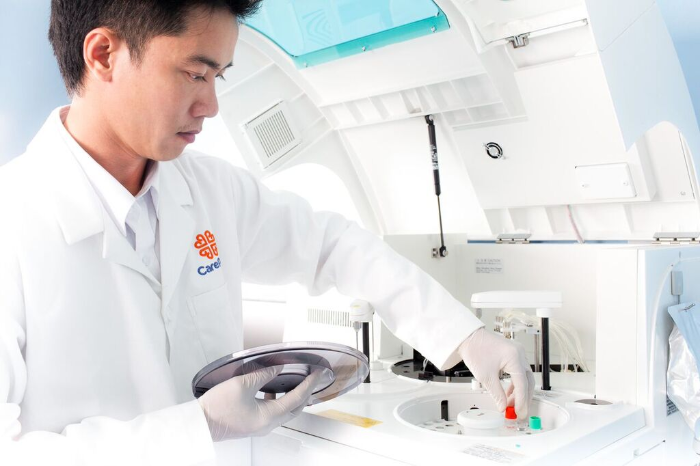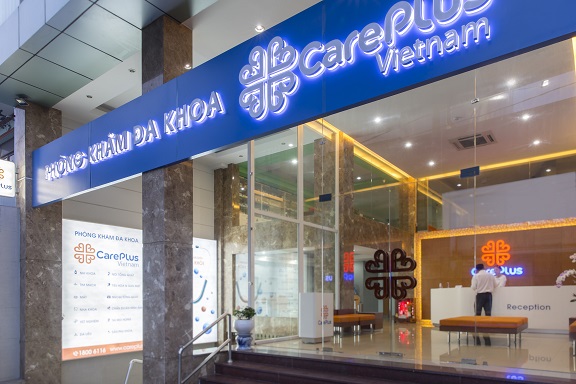General Health Screening for Women (Executive)
The Advanced General Health Screening for Women includes additional screenings for hepatitis B, Pap smear test, heart ultrasound, thyroid ultrasound, and other extensive screening items.

DIFFERENCES BETWEEN EXECUTIVE AND ADVANCED GENERAL HEALTHCARE PACKAGE
See more about ADVANCED GENERAL HEALTHCARE PACKAGE FOR WOMEN here
a. CARDIOLOGY:
Regular cardiology check are recommended especially for people who are:
- Obesity/ overweighted
- Smoking
- Regular drinker
- Sedentary
- Over 40 years old
b. H.PYLORI TESTING:
H. pylori is a common cause of ulcers and the risk of stomach cancer. Infection with H. pylori is common. About two-thirds of the world’s population has it in their bodies. For about 80% people, it doesn’t cause ulcers or any other symptoms. Only about 10-15% can have ulcers and 1-3% develop gastric cancer.
H. pylori is usually infectious at an early age. You can get H. pylori from food, water, or utensils. It’s more common in countries or communities that lack clean water or good sewage systems. You can also pick up the bacteria through contact with the saliva or other body fluids of infected people.
c. HEPATITIS C:
Hepatitis B and hepatitis C are common in Asia and Vietnam has the highest rates of hepatitis, according to the World Health Organization. It causes few symptoms, it is usually detected when the person has had signs of damaged liver.
Currently, there is no vaccine for hepatitis C. The odds are higher that you’ll get hepatitis C if you:
- Had a blood transfusion before 1992. A screening test for HCV went into use that year.
- Share needles with infected people.
- Were born to a mother with hepatitis C
- Share personal items such as razors, toothbrushes, nail clippers, or anything else that could have your blood on it with infected people.
d. FECAL OCCULT BLOOD TEST
A test for fecal occult blood looks for blood in your poop, or feces. It can be a sign of a problem in your digestive system, such as a growth, or polyp, or cancer in the colon or rectum. If the results show that there is blood (whether you can see it or not), it’s important for your doctor to find the source of bleeding to diagnose and treat the problem.
- Age: The disease is most common in people over age 50, and the chance of getting colorectal cancer increases with each decade. But younger people can get it, too.
- Gender: Colorectal cancer is more common among men. Men and women are equally at risk for colon cancer, but men are more likely to develop rectal cancer.
- Polyps: These growths on the inner wall of the colon or rectum aren’t cancer, but they can be precancerous. They’re fairly common in people over age 50. One type of polyp, called an adenoma, makes colorectal cancer more likely. Adenomas are the first step toward colon and rectal cancer.
- Personal history: If you’ve already had colorectal cancer, you could get it again, especially if you had it for the first time before age 60. Also, people who have chronic inflammatory conditions of the colon, such as ulcerative colitis or Crohn's disease, are more likely to develop colorectal cancer than other people.
- Family history: If you have a parent, brother, sister, or child who has had colorectal cancer, you are more likely to get it, too. If that relative was diagnosed when he or she was younger than 45 years old, your risk is even higher.
- Diet: People who eat a lot of fat and cholesterol and little fiber may be more likely to develop colorectal cancer.
- Lifestyle: You may be more likely to get colorectal cancer if you drink a lot of alcohol, smoke, don't get enough exercise, and if you are overweight.
- Diabetes: People with diabetes are more likely to develop colorectal cancer than other people.
g. OVARIAN CANCER TUMOR MARKER:
Ovarian cancer is one of the most common types of genital tract cancer in women. Worldwide, ovarian cancer is the second most common type of cancer of the genital tract after cervical cancer, and is also the second leading cancer of the genital tract after cervical cancer. The causes of most ovarian cancers are unknown, but the risk factors include:
- Age: ovarian cancer is most common in women over 50 and in women who have stopped menstruating (have been through menopause), and the risk increases with age.
- Family history: Some ovarian cancers are linked to gene mutations first discovered in families with lots of cases of breast cancer. Your risk also goes up if you have a family history of breast cancer, colon cancer, uterine cancer or rectal cancer.
- Reproductive history: women who have not had children or who had children over the age of 35 may be slightly more at risk.
- Lifestyle factors: smoking and being overweight.
- Hormonal factors – including early puberty or late menopause, or using oestrogen-only hormone replacement therapy (HRT) for five years or more.
|
A. CONSULTATION WITH SPECIALISTS
|
|
B. IMAGING DIAGNOSIS
|
|
C. LAB TESTS
(*) Customers will meet with an obstetrician-gynecologist for an examination and consultation before being prescribed a service suitable for their health condition. |
- Please do not take all the medications you are using (diabetic medications, insulin…) on the morning of your blood test. Regular high blood pressure and/or heart medication can be continued.
- Please drink plain water and be fasten from urinating during the abdominal ultrasound for accurate results.
- Please wear clothing without metal buttons or do not wear metal jewelry during the X-ray and the electrocardiograms to avoid confusion, insertion of images, and electrocardiogram interference.
- For the Ladies doing Pap smear, it is advisable to do the test 5 days before or after menstruation for accurate results.
- Please be fasted from food and drinks for at least 8 hours and postpone to use using antibiotics before 4 weeks, stomach medicine 2 weeks before (if any) when performing the service H.Pylori Breath Test. For stool analysis, the specimen bottle will be provided on the screening day. However, you may collect the specimen bottle from our clinic prior to your appointment and collect your stool the night before.
- Please bring along any Past Medical Records (e.g. doctor's memo/X-ray films/ECG/medical report/ prescription/vaccination).
- Please bring along your Insurance Card (if any).
- Please bring along your Gift Vouchers/Gift Cards/eVouchers from CarePlus (if any).



